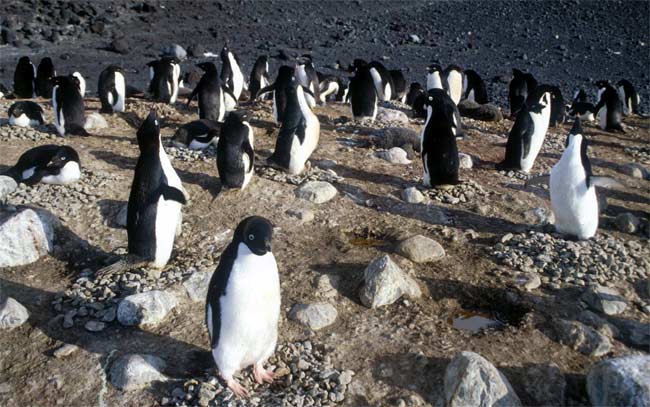Male Penguins' Calls Say 'I'm a Good Dad'

Female penguins have a particularly good reason to pay close attention to courters' mating calls — a male penguin's voice reveals how good a dad he will be.
The male penguin's call discloses how fat he is, a new study finds. Pudgy males are desirable because the extra fat means they can babysit the couple's eggs without needing to wander off in search of food.
"A fat male is a good choice for a female, because males do so much of the offspring care," said study researcher Dianne Brunton of Massey University in New Zealand. "They're able to incubate the eggs for longer and use up their fat stores, while skinny males aren't able to do that."
The results, announced today, were published earlier this year in thejournal Behaviour.
Courting a mate
Adelie penguins, a species of Antarctic penguin, come on land for just a few months each summer to breed and raise their chicks.
During courtship, males serenade prospective mates by throwing their heads back, pointing their beaks to the sky, and emitting a series of hoarse trills and squawks.
Get the world’s most fascinating discoveries delivered straight to your inbox.
"They're not musical calls — they sound like a cross between a donkey and a stalled car," said study researcher Emma Marks of the University of Auckland in New Zealand.
After choosing a mate the female lays two eggs and returns to sea, leaving the male alone to tend the egg until she returns to take the next shift. For the first two weeks penguin dads do the bulk of babysitting duty without breaking to eat. By relying on stored fat reserves, father penguins can lose more than 20 percent of their body weight over the summer breeding season, the researchers say.
The researchers wanted to know how courtship calls help a penguin female choose the father of her chicks. "We knew that females preferred some males over others. But we didn't know what traits females were using to choose a good mate," Brunton said.
The researchers traveled to Antarctica's remote Ross Island, summer home to half a million Adelie penguins. Over three months they weighed dozens of males and recorded their calls with a handheld microphone. They also noted how successful males were at attracting mates and raising chicks.
They found that steady frequency over the longest part of the call — an extended chattering in the middle of the male's display — best predicted male buffness and breeding success. "It's as if females are listening to the stability of the call," Marks said.
Males with more consistent pitch were snatched up more quickly. These males were also heavier and more successful at raising chicks , the researchers found. The researchers suspect body fat somehow stabilizes the calls.
"The fat surrounding the male's voice box changes what his call sounds like," Brunton said.
Faking it?
"What if the guy calls, and it turns out he's a skinny bird pretending to be a fat bird, making himself sound better than he really is?" Marks said.
In fact, females can't judge a male's fatness just by looking at him. "How fat he looks depends on how he's standing and how fluffed up his feathers are," Brunton said.
A male who lies about his paternal commitment might increase his chances of passing on his genes, said study researcher Allen Rodrigo, director of the National Evolutionary Synthesis Center in Durham, N.C. For that reason, females are likely to be on the lookout for the most honest indicators of paternal potential, he explained.
As penguin dads lost weight over the chick-rearing season, their calls changed too, Marks found. "So a skinny male is unlikely to be able to pretend he's a big fat male. He can't fake it," said Marks.
 Live Science Plus
Live Science Plus






